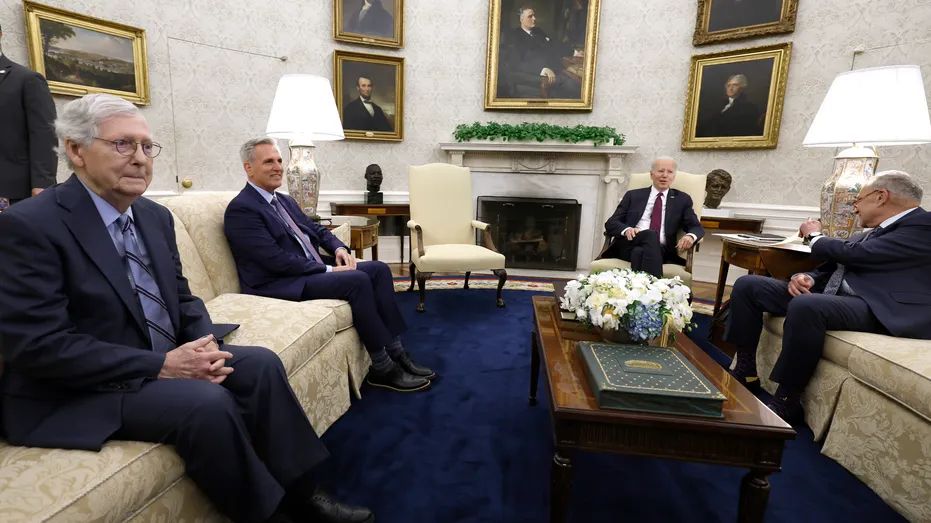President Joe Biden told reporters on Tuesday that he was considering invoking a constitutional provision about the validity of U.S. debts in order to skirt House Republicans amid a tense standoff on the country’s borrowing limit.
“I have been considering the 14th Amendment,” the president said after a meeting on the debt limit with Congressional leaders failed to make any meaningful progress. “I’ll be very blunt with you, when we get by this, I’m thinking about taking a look at — months down the road — to see what the court would say about whether or not it does work.”
Experts who spoke with Fox News Digital cast doubt on the viability of President Joe Biden invoking the 14th Amendment to the Constitution to raise the federal borrowing limit, each explaining that the likely reason for the law did not quite match the context of the situation.
The 14th Amendment reads, “The validity of the public debt of the United States, authorized by law, including debts incurred for payment of pensions and bounties for services in suppressing insurrection or rebellion, shall not be questioned.”
Top Biden officials have distanced themselves from the idea. Treasury Secretary Janet Yellen told ABC News’ This Week that invoking the amendment would cause a “constitutional crisis.”
And their hesitation appears to be shared by members of the legal community. Thomas Lee, professor of Constitutional Law at Fordham University, told Fox News Digital, “I wouldn’t call it crazy, because you know, it’s plausible based on a reading of the text, but given the context…I just don’t think it’s the best reading of it.”
“As applied to what President Biden might do today, it would be a unilateral presidential action, without congressional authorization…I don’t know exactly what that would be. He can’t borrow money to pay the debt: Congress has the power ‘to borrow Money on the credit of the United States’ under Article I, Section 8. I’m not a finance expert and so other than borrowing money, I am not sure exactly what the President could do to ‘ensure the public debt of the United States shall be questioned,’” Lee said.
But he predicted that, if facing a court challenge from House Speaker Kevin McCarthy, the Supreme Court may deny playing a role in the case altogether.
“My gut reaction, based on Chief Justice Roberts, is the Supreme Court might just say it’s nonjusticiable, which is, that this is not a rights-bearing provision. So we’re just not going to decide the political question,” Lee said.
Ilan Wurman, an associate professor of law at Arizona State University, argued that the 14th Amendment was not meant to cover debts incurred in the future.
“The plain reading of Section Four is that it has absolutely nothing to do with the debt limit. Existing debts cannot be questioned; but raising the debt ceiling is for the purpose of creating new debts. Nothing in Section Four says Congress must create new debt to service older debt. A failure to raise the debt ceiling in no way questions the validity of existing debts,” Wurman said.
” Congress has many other ways to pay off existing debt. It could sell public lands, for example, or reduce spending. But even if Congress somehow had no other options for servicing its existing debt, a failure to service a debt is not the same thing as questioning its validity. A creditor may or may not have a remedy for such failure–there aren’t typically bankruptcy proceedings for sovereigns – but that’s still not the same thing as voiding a debt. A right can still be a right even if there’s no effective remedy, and a debt can still be valid even if a creditor can’t collect.”
Carrie Severino, head of the Judicial Crisis Network, blasted Biden for even considering the move.
“It’s telling that the Biden administration is willing to consider far-fetched constitutional theories that even Janet Yellen won’t embrace rather than engaging in the real legislative work of dialogue and compromise,” Severino told Fox News Digital.
Yellen warned about the possible consequences of invoking the 14th Amendment during her ABC television interview over the weekend.
“There is no way to protect our financial system and our economy other than Congress doing its job and raising the debt ceiling and enabling us to pay our bills,” she said. “We should not get to the point where we need to consider whether the president can go on issuing debt. This would be a constitutional crisis.”


The Regime is always quoting Section Four – which still says nothing about the Federal executive administering the debt – while conveniently ignoring the one-line Section Five paragaph that follows:
Section 4
The validity of the public debt of the United States, authorized by law, including debts incurred for payment of pensions and bounties for services in suppressing insurrection or rebellion, shall not be questioned. But neither the United States nor any State shall assume or pay any debt or obligation incurred in aid of insurrection or rebellion against the United States, or any claim for the loss or emancipation of any slave; but all such debts, obligations and claims shall be held illegal and void.
Section 5
The Congress shall have the power to enforce, by appropriate legislation, the provisions of this article.
I don’t see anywhere in this amendment where the executive branch has any say in the matter at all!